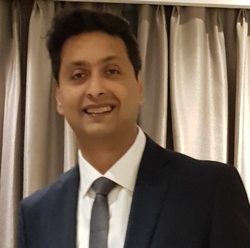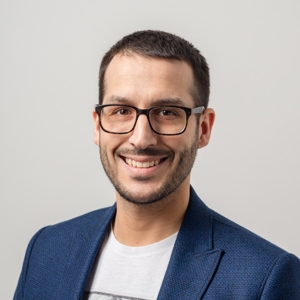PSC Support Expert Panel
Providing insight, scientific direction, and expertise to PSC Support
The PSC Support Expert Panel provides insight, scientific direction, and expertise to PSC Support.
The members of the Expert Panel are either i) recognised authorities from leading academic and medical institutions on the clinical management and/or research of PSC or ii) people affected by PSC. Each devotes their time and expertise to improving the lives of people with PSC and gives their time freely to the PSC Support Expert Panel activities.
Private Healthcare
The PSC specialists listed on this page offer NHS care. PSC Support regularly receives enquiries regarding PSC doctors who provide private appointments. While the charity does not endorse specific doctors, individuals seeking private healthcare options can easily find relevant details through an online search.
 Professor Adams' clinical interests are transplant hepatology and autoimmune liver disease including PSC. Laboratory research interests are focused on mechanisms of immune-mediated liver disease.David Adams Professor of Hepatology, Director of the NIHR Biomedical Research Unit for Liver disease at the Queen Elizabeth Hospital, Pro-Vice-Chancellor, Head of College of Medical and Dental Sciences and Dean of Medicine and Director of NIHR Birmingham Biomedical Research Centre at the Queen Elizabeth Hospital, Birmingham.
Professor Adams' clinical interests are transplant hepatology and autoimmune liver disease including PSC. Laboratory research interests are focused on mechanisms of immune-mediated liver disease.David Adams Professor of Hepatology, Director of the NIHR Biomedical Research Unit for Liver disease at the Queen Elizabeth Hospital, Pro-Vice-Chancellor, Head of College of Medical and Dental Sciences and Dean of Medicine and Director of NIHR Birmingham Biomedical Research Centre at the Queen Elizabeth Hospital, Birmingham.
Professor Adams is also a Trustee of PSC Support.
 Dr Richard Aspinall is a consultant hepatologist at the Queen Alexandra Hospital in Portsmouth.
Dr Richard Aspinall is a consultant hepatologist at the Queen Alexandra Hospital in Portsmouth.
He qualified as a doctor in 1992 and trained in hospital medicine, gastroenterology and hepatology in Liverpool, Sheffield, Cambridge and London. He was a Lecturer at the Royal Postgraduate Medical School, Hammersmith Hospital and was awarded a research PhD in Immunology from Imperial College, London. In 2004 he moved to California, where he was Associate Hepatologist at the Scripps Liver Center in San Diego for two years. On his return to the UK, he was a consultant at the University Hospital of Wales in Cardiff before relocating to Portsmouth in 2010, with the remit of establishing clinical services for people with liver conditions. The Portsmouth Liver Centre has since grown into one of the largest in Southern England, providing a range of specialist services including a satellite transplantation clinic with the Royal Free Hospital London.
He has a keen interest in evaluating new treatments for liver disorders and is the National Industry Lead for the NIHR Hepatology Research Network, as well as the Wessex regional lead for Hepatology. He is a member of national steering committees for the Improving Quality in Liver Services (IQILS) programme and the BASL Immune-Mediated Liver Disease special interest group. He is a regular contributor to the Lancet Commission into Liver Disease in the UK. From 2016-2019, he was the Liver Section secretary for the British Society of Gastroenterology.
PSC Support Scientific Review Committee
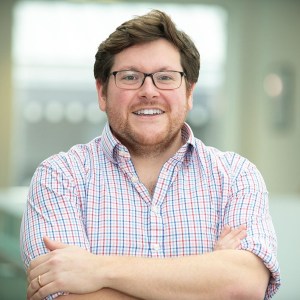 Luke Boulter graduated from the University of York in 2007 with a BSc(Hons) in Molecular Cell Biology. From there he went to work on the mechanisms of liver repair at the MRC Centre for Inflammation Research in Edinburgh, where he was awarded a PhD in 2011. After a short spell as a post-doctoral fellow in the MRC Centre for Regenerative Medicine, investigating the signals that promote the growth of cholangiocarcinoma, he started his own lab at the MRC Human Genetics Unit and works on the mechanisms by which the bile duct develops in the embryo, repairs itself during disease and becomes cancerous.
Luke Boulter graduated from the University of York in 2007 with a BSc(Hons) in Molecular Cell Biology. From there he went to work on the mechanisms of liver repair at the MRC Centre for Inflammation Research in Edinburgh, where he was awarded a PhD in 2011. After a short spell as a post-doctoral fellow in the MRC Centre for Regenerative Medicine, investigating the signals that promote the growth of cholangiocarcinoma, he started his own lab at the MRC Human Genetics Unit and works on the mechanisms by which the bile duct develops in the embryo, repairs itself during disease and becomes cancerous.
Luke is particularly interested in the fundamental biology of the bile duct in health and disease, with the ultimate goal of developing new therapies which can be developed to help patients.

Chairman, PSC Support Scientific Review Committee
Roger Chapman was born in South Wales and attended a Grammar school in Cardiff. He lives in Oxford and is married to a retired doctor with 4 grown up children, one of whom is an intensive care consultant in Perth, Australia.
He qualified from St Bartholomew’s Hospital, University of London in 1974, and trained in liver disease, firstly as a registrar in the Liver Unit in Southampton, and then as a lecturer on the Liver Unit at the Royal Free Hospital in London, from 1976 to 1981 under the supervision of Prof Sheila Sherlock, obtaining an MD on “Iron Metabolism in Liver Disease” in 1981.
He moved to Oxford as senior registrar in 1981, becoming a consultant at the John Radcliffe Hospital in 1986. He spent an “off service year” year as a visiting scientist at the University of Washington in Seattle in 1983-4.
Whilst at the Royal Free he developed a research interest in liver disease associated with Inflammatory Bowel Disease which he has continued to this day. He has published 5 books, 76 book chapters and 270 original articles mainly in the field of autoimmune liver disease, viz primary sclerosing cholangitis (PSC), primary biliary cholangitis (PBC) and latterly IgG4 related disease.
He is a founding member (in 1992) of the International Autoimmune Hepatitis Group (IAHG) producing position papers in the field of Autoimmune Hepatitis. More recently he has been involved in the foundation of the International PSC Study Group (in 2009) facilitating collaboration between different international centres researching into PSC and the foundation of British Autoimmune Liver Disease Study Group (2010). He is one of the authors of European (EASL) guidelines for “Cholestatic liver diseases” and the first author of the North American (AASLD) guidelines on the “Management of Primary Sclerosing Cholangitis”.
Roger is medical advisor/consultant to Perspectum Diagnostics Ltd (not an employee).
In 2014, Roger was awarded a Fellowship of the American Association for the Study of Liver Diseases (AASLD). In 2015, he was awarded the Lifetime Achievement Award from British Association of the Study of the Liver (BASL) and an Honorary Life Membership of BASL. He has retired from clinical practice but still involved in teaching and research into autoimmune liver disease.
He helped found the PSC Support charity in 1995 and has been a Trustee and medical advisor to the organisation from its inception until retiring from the board in 2023. He has just become Chairman of the Scientific Research Committee for the charity.
Away from medicine, he enjoys watching and playing sport particularly tennis and golf, and is a regular opera goer.
PSC Support Scientific Review Committee
 Dr Emma Culver is a clinician scientist in Oxford, with an interest in immune-mediated liver diseases including PSC, IgG4-related cholangitis and autoimmune hepatitis. She graduated from the University of Edinburgh with a BSc in Neuroscience (2001) and a Bachelor of Medicine and Surgery (2004), and from Oxford University with a DPhil in Clinical Medicine (2015).
Dr Emma Culver is a clinician scientist in Oxford, with an interest in immune-mediated liver diseases including PSC, IgG4-related cholangitis and autoimmune hepatitis. She graduated from the University of Edinburgh with a BSc in Neuroscience (2001) and a Bachelor of Medicine and Surgery (2004), and from Oxford University with a DPhil in Clinical Medicine (2015).
She is the Chief Investigator for UK-IgG4, on the Steering Committee for the BASL Immune-Mediated Liver Disease Special Interest Group, and is a member of the international study groups for PSC and Autoimmune Hepatitis. She receives funding from the Wellcome Trust, Academy of Medical Sciences and NIHR BRC Oxford for translational research in immune-mediated liver diseases.
Dr Jess Dyson is a consultant hepatologist at the Freeman Hospital in Newcastle and an Honorary Clinical Senior Lecturer at Newcastle University.
She has a specialist interest in immune-mediated liver diseases including PSC, primary biliary cholangitis (PBC), autoimmune hepatitis (AIH) and overlap syndromes. She graduated from Newcastle University in 2005. She is the Principal Investigator for UK-AIH, on the Steering Committee for the BASL Immune-Mediated Liver Disease Special Interest Group, a member of the international study groups for PSC and AIH and a contributor to the Lancet Commission into Liver Disease in the UK.
She has just submitted her NIHR-funded PhD that focused on looking for potential environmental triggers for PSC, PBC and AIH.
 Dr James Ferguson is the clinical lead for the IQILS project, Treasurer of BASL and was a co-author of the recent Lancet Commission on liver disease in the UK.
Dr James Ferguson is the clinical lead for the IQILS project, Treasurer of BASL and was a co-author of the recent Lancet Commission on liver disease in the UK.
Dr Ferguson is a transplant hepatologist based at the Queen Elizabeth Hospital in Birmingham.
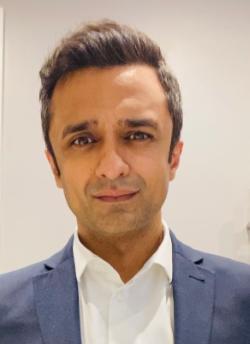
Dr Deepak Joshi is a consultant transplant hepatologist and lead for pancreatico-biliary medicine at King's College Hospital, London.
He helps support the liver transition services supporting the safe transfer of paediatric patients into adult services. He is an advanced biliary endoscopist performing procedures in adults and children. He leads the biliary clinical trials portfolio at King's. He is a member of the BSG liver committee since 2016.
 Dr Kate Lynch has spoken at various international meetings on her research as well as on PSC, and published over 20 manuscripts, review articles and book chapters in international peer-reviewed journals and textbooks. She is passionate about helping patients with PSC, in helping to manage their condition and teach them about their disease, as well as pursuing research which will improve outcomes for patients living with PSC. She is involved in patient and public education on the condition, speaking at various patient support group meetings as well as being an expert medical advisor to PSC Support UK and PSC Support Australia. She has recently returned to Adelaide, Australia, after 7 years at Oxford under the tutelage of Dr Roger Chapman and Prof Satish Keshav, and she aims to continue her research in this area in Australia.
Dr Kate Lynch has spoken at various international meetings on her research as well as on PSC, and published over 20 manuscripts, review articles and book chapters in international peer-reviewed journals and textbooks. She is passionate about helping patients with PSC, in helping to manage their condition and teach them about their disease, as well as pursuing research which will improve outcomes for patients living with PSC. She is involved in patient and public education on the condition, speaking at various patient support group meetings as well as being an expert medical advisor to PSC Support UK and PSC Support Australia. She has recently returned to Adelaide, Australia, after 7 years at Oxford under the tutelage of Dr Roger Chapman and Prof Satish Keshav, and she aims to continue her research in this area in Australia.
Dr Kate Lynch (née Williamson) is a gastroenterologist and hepatologist practising in Adelaide, South Australia. Her interests lie in autoimmune liver diseases, such as PSC, PBC and autoimmune hepatitis, as well as inflammatory bowel disease. She has just recently completed her DPhil in Clinical Medicine at University of Oxford, entitled "Peripheral blood, Liver and Intestine-specific lymphocytes in Primary Sclerosing Cholangitis and Inflammatory Bowel Disease".
Her current research involves analysis (via flow cytometry, immunohistochemistry and single cell RNA sequencing) of immune cells derived from the peripheral blood, gut, and liver in patients with PSC/IBD and controls. In particular, she harnesses a minimally invasive technique, fine needle aspiration of the liver, to access immune cells directly from the PSC liver. The aim of her research is to understand further the gut-liver axis role in the pathophysiology of PSC/IBD. In addition to laboratory-based research, Kate is involved in clinical trials of novel agents in both PSC and IBD.
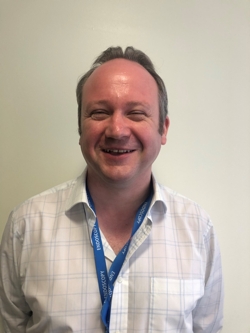 Dr Simon Rushbrook is a hepatologist with a sub-speciality in Hepatobiliary Medicine and Liver Transplantation
Dr Simon Rushbrook is a hepatologist with a sub-speciality in Hepatobiliary Medicine and Liver Transplantation
His clinical expertise is in the management of patients with acute and chronic liver disease (especially autoimmune liver disease and particularly PSC), liver transplantation and Hepatobiliary medicine. He provides endoscopic management of portal hypertension and performs ERCP (+spyglass cholangioscopy) and radial and linear endoscopic ultrasound (EUS).
In 2008, Simon established a UK consortium of investigators for the collection of DNA and clinical data from patients with primary sclerosing cholangitis (UK-PSC). This has led to a number of high impact publications in the area of PSC genomics alongside clinical scoring systems of PSC through international collaborations, one of which was recently published in Hepatology (UK-PSC Risk Score).
Simon qualified in 1997 from the United and Medical Dental Schools of Guys and St Thomas’s. Having completed his House jobs in London he moved to Cambridge where he completed a 4 year PhD establishing the role of T regulatory cells in chronic viral hepatitis. During this time he gained experience in liver transplantation and acute and chronic liver disease. Simon then undertook further period of training in the Cambridge liver unit pre-and post-CSST. During his PhD and training, he undertook ERCP and EUS and has continued to develop an interest in hepatobiliary disease/liver autoimmune disease (particularly PSC) through UK-PSC and his clinical practice. He is currently the service lead for the BASL committee and sits on the UK Cholangiocarcinoma Board and UK-PSC Steering group. Simon was clinical director for gastroenterology department at the Norfolk and Norwich University Hospitals and was responsible for the opening of the Quadram Institute endoscopy department and Clinical Research and Trials Unit.
Simon enjoys spending time with his family and playing both classical and jazz piano.
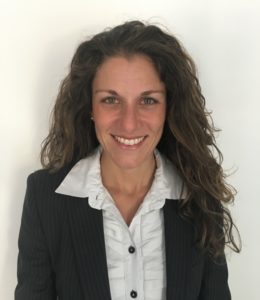 Dr Francesca Saffioti is a Consultant Hepatologist at Oxford University Hospitals. She graduated in Medicine with First class honours in 2008, from the University of Messina, Italy, where she also obtained her CCT in Internal Medicine in 2014. She subsequently undertook specialist training in Hepatology at the Royal Free Hospital, London, where she developed particular interest in the study of the cholestatic and autoimmune liver diseases (primary sclerosing cholangitis, primary biliary cholangitis and autoimmune hepatitis), as well as in the non-invasive assessment of liver fibrosis and portal hypertension. She completed a PhD in Clinical and Surgical Biotechnologies at the University of Messina, Italy, in 2018, on the topic of “Non-invasive assessment of liver fibrosis and portal hypertension in primary sclerosing cholangitis and primary biliary cholangitis: transient elastography, point share wave elastography and biomarkers”, and additionally obtained the title of Doctor Europeus.
Dr Francesca Saffioti is a Consultant Hepatologist at Oxford University Hospitals. She graduated in Medicine with First class honours in 2008, from the University of Messina, Italy, where she also obtained her CCT in Internal Medicine in 2014. She subsequently undertook specialist training in Hepatology at the Royal Free Hospital, London, where she developed particular interest in the study of the cholestatic and autoimmune liver diseases (primary sclerosing cholangitis, primary biliary cholangitis and autoimmune hepatitis), as well as in the non-invasive assessment of liver fibrosis and portal hypertension. She completed a PhD in Clinical and Surgical Biotechnologies at the University of Messina, Italy, in 2018, on the topic of “Non-invasive assessment of liver fibrosis and portal hypertension in primary sclerosing cholangitis and primary biliary cholangitis: transient elastography, point share wave elastography and biomarkers”, and additionally obtained the title of Doctor Europeus.
Francesca is an active member of the International Study Groups for PSC, the UCL Immune & Cholestatic Liver Disease group of the Institute for Liver and Digestive Health, London, the British (BASL), the Italian (AISF), the European (EASL) and the American (AASLD) associations for the Study of the Liver.
She has authored more than 20 papers published in international peer-reviewed journals, 3 chapters in medical textbooks, and has presented her scientific work in numerous national and international conferences.
Francesca has been a collaborator of PSC Support since 2014.
She remains actively involved in research, and has been sub-investigator in several clinical trials for the study of novel therapeutic options in PSC.
Dr Brijesh Srivastava is a consultant Hepatologist and clinical lead for Liver services at University Hospital of Wales, Cardiff. He is a member of the national liver disease implementation group in Wales. His sub-speciality interest is in cholestatic and autoimmune liver diseases.
Brijesh completed his specialist liver training at Addenbrooke’s Hospital, Cambridge and trained in ERCP. Brijesh was the UK-PSC research fellow from 2010 until 2013, during which time he recruited patients with PSC and collected their DNA samples for the UK-PSC study. He has presented his research work at various national and international meetings.
His clinical and academic interests are autoimmune and cholestatic liver diseases, biliary endoscopy and liver transplantation with a particular interest in PSC. Dr Douglas Thorburn has been a consultant hepatologist since 2003, initially in Birmingham, and since 2007 at the Royal Free.
Doug has published regularly on PSC and is the Chair of UK-PSC. He is Clinical Director for liver services at the Royal Free and Chair of the NHSBT Liver Advisory Group.
 Dr. Trivedi is Associate Professor and Consultant Hepatologist in Birmingham, who leads the Birmingham PSC and PBC clinical research program.
Dr. Trivedi is Associate Professor and Consultant Hepatologist in Birmingham, who leads the Birmingham PSC and PBC clinical research program.
He has current interest in immune-mediated liver disease and liver transplantation, and is the current Chief Investigator for UK-PSC and Chair of the BASL Immune-Mediated Liver Disease special interest group (SIG).
PSC Support Scientific Review Committee
 Dr Andrew Yeoman qualified in 1998 from the University of Wales College of Medicine and subsequently trained in hepatology in Wales, Auckland and Kings College, London where he was awarded an MD for studying clinical outcome prediction in autoimmune hepatitis.
Dr Andrew Yeoman qualified in 1998 from the University of Wales College of Medicine and subsequently trained in hepatology in Wales, Auckland and Kings College, London where he was awarded an MD for studying clinical outcome prediction in autoimmune hepatitis.
He was appointed as a Consultant Hepatologist at the Gwent Liver Unit in 2010 and, since 2015, has been clinical lead for the Wales Liver Disease Delivery Plan.
Dr Yeoman's clinical interests lie in autoimmune liver disease and the early detection of liver disease and its complications. He is a member of the Lancet Commission into Liver Disease in the UK and has served on the BSG Guidelines Development Groups for the Management of Abnormal Liver Blood Tests and Autoimmune Hepatitis. He is also a steering committee member of the BASL Immune-Mediated Liver Disease special interest group (SIG).
PSC Support Scientific Review Committee
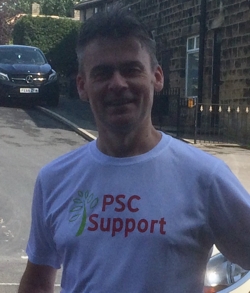
Chris a patient, who was diagnosed with PSC in 2013. He works at the University of Leeds, teaching and researching in Business, Human Resources and Employment Relations.
Chris' hobbies include running and playing the saxophone. He enjoys raising money for PSC Support through his running, most recently completing the Great North Run and Yorkshire Marathons.
He enjoys helping PSC Support in their important work in providing information, advocating for patients and funding vital research.
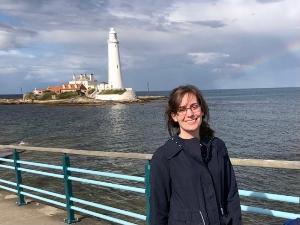
Jenny was diagnosed with PSC in 2014, having previously been diagnosed with Crohn’s disease. She lives with her husband and young family and is keen to help PSC Support with its invaluable work in helping patients and families living with PSC.
Diagnosed with PSC and an AIH overlap in 2008, Gary underwent a liver transplant in January 2017 after just 9 weeks on the waiting list.
Having experienced the condition from diagnosis through transplant, I wanted to share my experience of PSC with other patients to provide a level of transparency and reality; particularly in the younger age group and those with children.
The work that Martine and the wider PSC Support team continuously undertake has been invaluable in helping to improve the lives of people with primary sclerosing cholangitis (PSC) through support, education, advocacy and research.
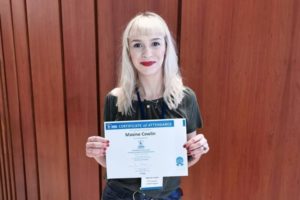
Maxine at EURORDIS Summer School training
Maxine was diagnosed with PSC in 2006 at the age of 17. After 7 years of her PSC staying fairly under control, studying dance at university, working and travelling, Maxine’s condition progressed unexpectedly and significantly. She was listed for transplant in 2013 and spent 15 months on the transplant waiting list until she received her new liver.
In December 2018, Maxine was appointed as Programme Development Officer for PSC Support, becoming the charity’s first ever employee.
'PSC Support has helped me enormously since my diagnosis in 2006. Without the charity and its commitment to supporting patients and providing up to date, quality information, my experience with PSC would have been even more challenging. I am extremely passionate about fulfilling the objectives of PSC Support and am dedicated to ensuring the charity continues to move forwards and help even more people.’
Martine, PSC Support Trustee, was diagnosed with PSC in 2007, and has volunteered for PSC Support since then, being Chair of Trustees from 2011 to 2022. She is driven and committed to doing everything in her power to help progress PSC research towards effective treatment, and making those treatments accessible to all PSC patients.
Recognising that there was a gap between the way medical professionals saw PSC and the way PSC patients saw (and lived with) PSC, she drew together and evidenced patient perspectives through PSC Support to help drive improvements in care and to influence PSC research direction. This was the impetus for the PSC Quality of Life Measure, which is under development in the UK.
PSC Support Scientific Review Committee
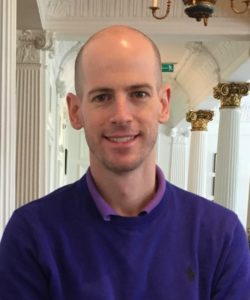
Originally from Cape Town (South Africa) Gareth immigrated to the UK in 2006 - Fast forward 10 years and married to Vicki with a 10 month old daughter, he was diagnosed with PSC in August 2016. Since then Gareth has developed a keen interest in PSC and monitors related research closely. He’s frequently educating Nurses and GP’s about the condition itself and plans to continue raising awareness as often as he can.
Having taken part in a clinical trial himself, Gareth believes patients have a key role in finding a cure and advocates patient participation in clinic trials.
Gareth has been supporting PSC Support on a number of projects since September 2017 and is an active contributor on the PSC Support Facebook page.
Outside of PSC life, Gareth has worked in Banking since 2006, of which 11 years (and counting) have been spent in Fraud & Credit Risk analytical based roles where he’s gained valuable experience writing and reviewing papers and recommendations.
Gareth enjoys travelling, playing golf and photography. He tries to keep active and in May 2019 walked the West Highland Way, raising over £4000 for PSC Support.

